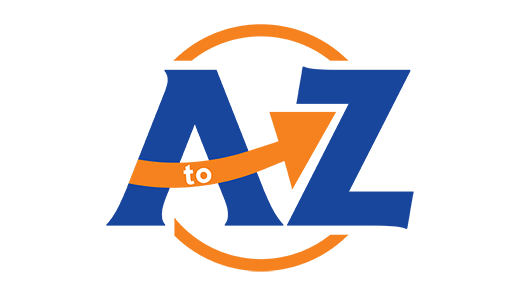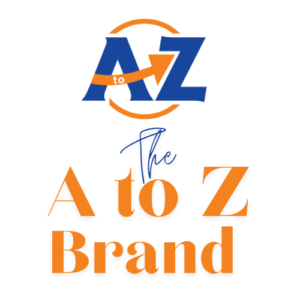22 May The Genesis of my Nickname, AZ
How my nickname became a one-stop shop brand
My nickname is AZ (A to Z), one of the easiest nicknames in the world. No one should struggle to pronounce the first and last letters of the English alphabet 🙂
I’m writing this blog because there is a strong reason why I’ve been using this easygoing nickname.
Pronouncing my full name is very easy for fellow Ethiopians. That changed when I moved to the US in 2005, though.
Dealt multiple culture shocks
Let me give you the history of how it all started.
When I first came to America in 2005, I thought people would easily understand my accent and pronounce my Ethiopian name without difficulty. I was mistaken!
I was also naïve to think that I could easily understand the American accent and get along well from the get-go. Deadly wrong!
Back then, my cultural intelligence was very rudimentary. As a result, I didn’t anticipate a rough transition from someone’s native culture to a culture one is a stranger.
My transition was bumpy! I was culturally shocked.
 Of course, this wasn’t the first time I was rattled by culture shock. However, unlike the cultural shocks I had faced before 2005, the cultural shock I experienced when I crossed the US culture rocked me big time, to say the least.
Of course, this wasn’t the first time I was rattled by culture shock. However, unlike the cultural shocks I had faced before 2005, the cultural shock I experienced when I crossed the US culture rocked me big time, to say the least.
- When I first moved from Harar– a very diverse and liberal city in the eastern part of Ethiopia, to a very formal and relatively conservative capital city of Ethiopia- Addis Ababa, I experienced a mild culture shock. For those who may not know Harar, cursing and using vulgar language is the norm. You can imagine how I was stunned to realize that people in Addis didn’t communicate like we did back in my hometown. For sure, they were shocked by the way I was communicating and interacting with them…
- When I traveled from East Africa to different African countries in the West and South while I was the president of the Addis Ababa University Students’ Union, the largest university in my native country, I experienced substantial culture shock. For instance, I watched with amusement how Ghanaian student leaders publicly disagreed and battled on the stage in favor and against the ruling party. But, once they were off the stage, they mingled well and got along. When Ghanaian music hit, they danced as if they were best friends. They also held hands and formed a circle to sing the national anthem at the end of the program.
As you can see, crossing sub-cultures within the same nation and then the same continent didn’t immunize me when I moved to the US. When I crossed the US culture, a totally different culture than Ethiopian and other African, Asian, and South American cultures, the shock was very significant.
If the culture shock I experienced when I crossed subcultures within Ethiopia was a mere 3 out of 10, the culture shock I experienced in other African countries was 5 on the Richter scale. When I moved to the US, the magnitude of the shock was 9 out of 10.
One of the first cultural identity modifications I made in the US
Looking back, I didn’t respond well to the huge cultural shock that rocked me in 2005. For weeks, I was:
- Complaining,
- Resenting, and
- Murmering.
I thought my native culture was a flagship culture. I wondered why people communicated and behaved differently than we did back home.
Culture is powerful. It makes you blindly loyal and never question it. It makes you believe that your own culture is superior while other people’s cultures are inferior.
This biased positive attitude toward one’s native culture may be okay if one doesn’t mix with others. But, it is a huge stumbling block when one lives and works with diverse people with different cultural identities…
Luckily, I was awakened quickly. It dawned on me that nothing will change unless I change. And therefore, I immediately:
- Accepted reality,
- Took responsibility, and
- Stopped complaining!
The first reality I accepted was that I was a newcomer to a culture to which I was a stranger. It would have been great if the entire culture and people around me had changed to adjust for me. Fortunately, I quickly developed enough cultural intelligence and realized it couldn’t happen.
Swallowing my pride, I began making modifications.
One of the early cultural adaptations I went through was helping people from diverse cultures communicate with me easily.
The easiest and quickest modification I needed to make was using a nickname.
As a result, I came up with one of the easiest nicknames, AZ (A to Z, the first and the last letters of the English alphabet).
Some people don’t want to use my nickname
Unfortunately, this move didn’t impress some of my friends. As I shared in my recent blog, “Authenticity vs. Inclusion: Mutually Exclusive?” they felt I wasn’t proud of my cultural heritage.
I still meet some people who refuse to take the easy route and use my nickname. These good people insist on saying: “I’m not going to use your nickname. Tell me how to pronounce your name until I get it right.”
Some people thought I was being a pushover. They encouraged me to be assertive and demanded people to use my full name. “Don’t allow others to get away with this. Don’t give them a nickname. They must learn to pronounce your full name.” Here are at least two strong reasons why I’m not bothered about giving people a nickname:
- I’m a communication expert. It is my job to make it easy for people outside of my culture to communicate with me effortlessly. I don’t want people to worry whether they could pronounce my name right or not and whether I’d be offended if they botched the pronunciation of my name. I don’t want it to become a communication barrier.
- My name isn’t me. A long time ago, I discovered that I’m not my name. What the heck! I’m not even my physical body! My original name was meant to be an identifier, helping people in my native community communicate with me with ease. My name isn’t my core identity. Thus, using a nickname as I live and work among people from diverse cultures doesn’t diminish who I’m. I don’t feel as if I dropped part of me.
That said, there is nothing wrong with having a name that is hard to pronounce by others outside of one’s native culture.
A quick disclaimer: If somebody prefers not to come up with a nickname, we should respect their choice.
Nonetheless, given my passion and goal in life, which requires serving a larger number of diverse people, I preferred people to use my nickname. I want to make the lives of my non-Ethiopian friends, colleagues, clients, and other stakeholders very easy by giving them one of the easiest nicknames in the world.
Using A to Z as a brand
Till recently, my nickname was just a personal identifier for people outside of my community. Now, my nickname- A to Z, is a brand.
On top of making it easy for people who struggle to pronounce my full name, I came to realize that it represents who I want to become and what I have been trying to do to help others.
Let me explain. At the early stage of my career as a learning professional, I had two choices:
- To be a Specialist or
- To become a Generalist.
Who influenced me to become a generalist?
Though both paths have their respective merits and drawbacks, I was persuaded to pursue the generalist pathway.
First, I was influenced by the writings of Alan Weis, the rock star of consulting, who played a huge role for me to take this route. Later, David Epstein, the author of “Range: Why Generalists Triumph in a Specialized World” also influenced me.
The decision to become a generalist wasn’t easy, though.
I had two choices:
- To specialize and risk becoming a one Trick Pony, or
- To generalize and become Jack of all Trades Master of None.
Ultimately, becoming a generalist won the contest for some strong personal and business reasons.
The two strong reasons that swayed me to generalize
- Personally, I desired to grow holistically. I didn’t want to narrow my growth. I desired to grow holistically in all aspects of life.
- Business-wise, I had mixed feelings. On the one hand, I recognized the benefits of becoming a specialist. It would have given me a competitive advantage over other generalists. On the other hand, I didn’t want to go all in pursuing one subject matter, risking it all if no one was interested in what I offered. Specializing didn’t make business sense to me then and still now, though I respect people’s choice to specialize.
As a generalist, I’m committed to mitigating the impacts of not specializing. For instance, we don’t specialize in offering assessments such as 360, DiSC, TKI, MBTI, EQ, and so on. However, we partner with companies that specialize in these fields.
We help our individual and corporate clients choose the right assessments for a project. Then, our clients will take these assessments online through a vendor we already know and trust, and we collect the reports and:
- Conduct the debrief based on the results of the assessment, and/or
- Facilitate a group discussion that leads to coming up with action plans to leverage the results of the assessment.
We also subcontract to other specialists. We take contracts from our clients. We’re responsible to:
- Fully understand the challenges, needs, and goals of our clients.
- Clearly scope the projects.
- Subcontract some or all parts of the projects to the right freelancers and contractors who specialize in those parts we don’t.
- Review the works of the contractors and freelancers.
- Provide feedback to the contractors and freelancers to ensure that our clients’ expectations are met, even exceeded.
- Deliver the end products to the client directly.
- Discuss the next steps and how we may continue to support them going forward.
This arrangement is a win-win. Working with us saves our clients time, energy, and money. They don’t need to:
- Find the right vendor.
- Qualify to see if they know what they’re doing.
- Communicate and agree on the scope and price of the project.
- Monitor to see whether things are going as planned.
- Evaluate the works of so many specialists and freelancers. We take care of the entire process. That is the advantage of working with a one-stop-shop, A to Z, company like ours.
As an A-to-Z brand, we offer three success pathways for individuals, teams, organizations, and communities to grow holistically, achieve their goals, and succeed in what they do:
For each success pathway, we have A to Z services:
- Workshops. We custom design and deliver 1 – 3 days of webinars or workshops based on the latest adult learning principles. Our workshops are dynamic, interactive, engaging, and full of the latest insights, practical models, tools, approaches, strategies, and tactics to achieve tangible results and immediately bring change.
- Speeches. We offer high-impact and result-oriented motivational and keynote speeches. These speeches are designed to inspire, challenge, stretch, and empower our audience to overcome their challenges and leverage their opportunities by tapping into their unlimited individual and collective potential.
- Consulting. We use our consulting services to support entrepreneurs in forming and launching their first or next organization. We help them create a unique culture or reform an existing one. We also work with them to scale their company to the next level.
- Coaching. We offer one-on-one and group coaching according to our clients’ needs and preferences. Our coaching programs can be taken with or without taking assessments such as 360, MBTI, DiSC, EQ, and so on. We tailor each coaching program to meet the needs and objectives of our coachees.
- Programs. We have short-, medium-, and long-term programs such as Summits, Masterminds, and Cohorts. These programs are designed according to participants’ level of growth. For instance, we have cohort programs for Emerging, Middle, and Executive Leaders.
In recent years, on top of offering services to help our clients grow holistically in the areas of organizational, leadership, and personal development, the shop has been expanding and adding additional services to meet the needs of our existing and future prospective clients:
- Business Brokerage. We support our clients in buying or selling their businesses. We conduct preliminary valuation and detailed financial and market analyses.
- Commercial Real Estate. We help our clients to buy or lease their office spaces.
- Investments. We give our clients investment opportunities by finding off-market business and commercial real estate deals.
The one-stop shop will continue to expand in the coming years to offer additional products and services to meet the needs of our current and future prospective clients. Our dear clients don’t need to waste their time, energy, and resources working with many providers and vendors. We will take care of their needs in-house or in partnership with the best providers.
For any questions, please reach out to our team at info@SuccessPathways.net

